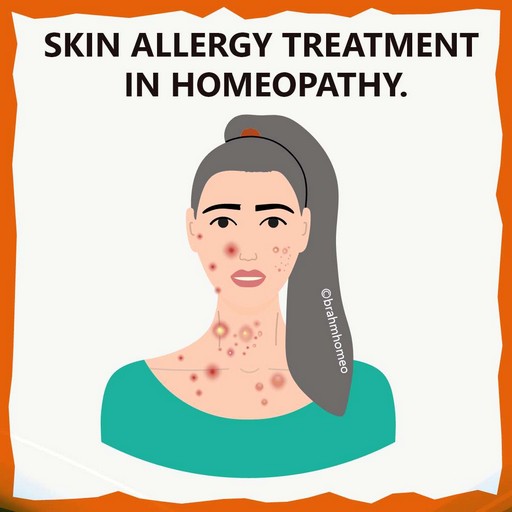
Skin Allergy treatment in homeopathy
Skin allergy is a change of the human skin which affects its color, appearance, or texture.
It may be localized in one part of the body, or affect all the skin. It may cause the skin to change color, itch, become warm, bumpy, chapped, dry, cracked or blistered, swell, and may be painful.
Causes
Allergies occur when your immune system reacts to a foreign substance. Your immune system produces proteins known as antibodies. These antibodies protect you from unwanted invaders that could make you sick or cause an infection. When you have allergies, your immune system makes antibodies that identify your particular allergen as something harmful, even though it isn't.
When you inhale the allergen or come into contact with it, your immune system responds and produces an inflammatory response on skin.
Symptoms
· Rashes,
· itch
· Dryness and cracked
· Painful blister
· Occasionally bleed from skin.
Common allergens that can cause this type of reaction-
Artificial Jewelry
Latex or Rubber
The sap from rubber trees is mixed with a chemical and used to make products like:
- Rubber gloves
- Condoms
- Erasers
- Elastic waistbands and bras
- Balloons
Clothing
A rash on your trunk after you wear a shirt, or on your feet when you wear certain shoes or socks, could be from an allergy. You might have a reaction after you try on a new outfit, too.
The trigger could be the dyes or other chemicals used to process the fabric
Preservatives
Chemicals called formaldehyde releasers and parabens make beauty products-
- Shampoos and conditioners
- Sunscreens
- Lotions and moisturizers
- Makeup
- Hair dye
- Fake tattoos
Fragrances
These are the heart of perfume, cologne, and deodorant. They're added to face and body soaps. They're also used in cleaning products and to mask a bad smell.
Medications
Some meds in over-the-counter creams and ointments might make your skin problems worse.
Ultraviolet Light

Diagnosis
Our doctor will perform a physical examination, take a medical history, and possibly recommend the following tests:
· Allergy blood test. A blood sample is sent to a lab to measure your immune system's response to a specific allergen. This test measures the amount of allergy-causing antibodies in your bloodstream, known as immunoglobulin E (IgE) antibodies.
Prognosis
It is curable with homeopathic treatment. Since how long you are suffering from disease, has to do a lot with treatment plan. No matter, since when are you suffering from your disease either from recent time or since many years -everything is curable with us but in early stage of disease, you will be cured faster. For chronic conditions or in later stage or in case of many years of suffering, it will take longer time to be cured. Intelligent person always start treatment as early as he /she observe any sign and symptom of this disease, so immediately contact us as soon as you observe any abnormality in you.
How we work on this disease
Brahm research based, clinically proved, scientific treatment module is very effective in curing this disease. We have a team of well qualified doctors who observe and analysis your case systematically, record all the signs and symptoms along with progress of disease, understand its stages of progression, prognosis and its complications. After that they clear you about your disease in details, provide you proper diet chart [what to eat or what not to eat], exercise plan, life style plan and guide you about many more factors that can improve your general health condition with systematic management of your disease with homeopathic medicines till it get cured.


















